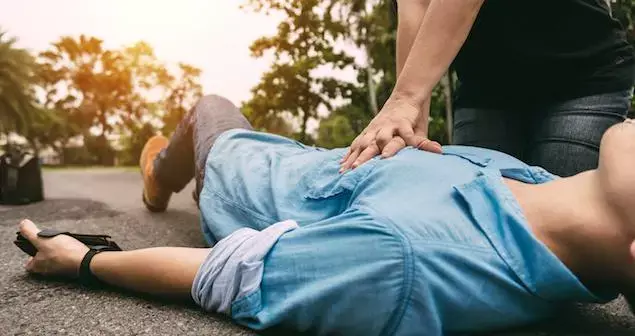- Home
- Medical news & Guidelines
- Anesthesiology
- Cardiology and CTVS
- Critical Care
- Dentistry
- Dermatology
- Diabetes and Endocrinology
- ENT
- Gastroenterology
- Medicine
- Nephrology
- Neurology
- Obstretics-Gynaecology
- Oncology
- Ophthalmology
- Orthopaedics
- Pediatrics-Neonatology
- Psychiatry
- Pulmonology
- Radiology
- Surgery
- Urology
- Laboratory Medicine
- Diet
- Nursing
- Paramedical
- Physiotherapy
- Health news
- Fact Check
- Bone Health Fact Check
- Brain Health Fact Check
- Cancer Related Fact Check
- Child Care Fact Check
- Dental and oral health fact check
- Diabetes and metabolic health fact check
- Diet and Nutrition Fact Check
- Eye and ENT Care Fact Check
- Fitness fact check
- Gut health fact check
- Heart health fact check
- Kidney health fact check
- Medical education fact check
- Men's health fact check
- Respiratory fact check
- Skin and hair care fact check
- Vaccine and Immunization fact check
- Women's health fact check
- AYUSH
- State News
- Andaman and Nicobar Islands
- Andhra Pradesh
- Arunachal Pradesh
- Assam
- Bihar
- Chandigarh
- Chattisgarh
- Dadra and Nagar Haveli
- Daman and Diu
- Delhi
- Goa
- Gujarat
- Haryana
- Himachal Pradesh
- Jammu & Kashmir
- Jharkhand
- Karnataka
- Kerala
- Ladakh
- Lakshadweep
- Madhya Pradesh
- Maharashtra
- Manipur
- Meghalaya
- Mizoram
- Nagaland
- Odisha
- Puducherry
- Punjab
- Rajasthan
- Sikkim
- Tamil Nadu
- Telangana
- Tripura
- Uttar Pradesh
- Uttrakhand
- West Bengal
- Medical Education
- Industry
Immediate angiography after out-of-hospital cardiac arrest without ST-segment elevation of no benefit: NEJM

USA: Early angiography shows no benefit over a delayed or selective strategy with regards to the 30-day risk of death from any cause in patients with resuscitated out-of-hospital cardiac arrest without ST-segment elevation, finds a recent study. The study findings were published in the New England Journal of Medicine on August 29, 2021.
Myocardial infarction (MI) is a common cause of lead to out-of-hospital cardiac arrest. Steffen Desch and colleagues aimed to determine the benefits of early coronary angiography and revascularization in resuscitated patients without electrocardiographic evidence of ST segment elevation
The multicenter trial included 554 patients with successfully resuscitated out-of-hospital cardiac arrest of possible coronary origin. They were randomly assigned to undergo either immediate coronary angiography (immediate-angiography group) or initial intensive care assessment with delayed or selective angiography (delayed-angiography group). The patients had no evidence of ST-segment elevation on post-resuscitation electrocardiography.
The primary endpoint was death from any cause at 30 days. Secondary endpoints included a composite of death from any cause or severe neurologic deficit at 30 days.
A total of 530 of 554 patients (95.7%) were included in the primary analysis.
Key findings of the study include:
- At 30 days, 143 of 265 patients (54.0%) in the immediate-angiography group and 122 of 265 patients (46.0%) in the delayed-angiography group had died (hazard ratio, 1.28).
- The composite of death or severe neurologic deficit occurred more frequently in the immediate-angiography group (in 164 of 255 patients [64.3%]) than in the delayed-angiography group (in 138 of 248 patients [55.6%]), for a relative risk of 1.16.
- Values for peak troponin release and for the incidence of moderate or severe bleeding, stroke, and renal-replacement therapy were similar in the two groups.
The researchers concluded, "Among patients with resuscitated out-of-hospital cardiac arrest without ST-segment elevation, a strategy of performing immediate angiography provided no benefit over a delayed or selective strategy with respect to the 30-day risk of death from any cause."
Reference:
The study titled, "Angiography after Out-of-Hospital Cardiac Arrest without ST-Segment Elevation," is published in the New England Journal of Medicine.
DOI: https://www.nejm.org/doi/full/10.1056/NEJMoa2101909
Dr Kamal Kant Kohli-MBBS, DTCD- a chest specialist with more than 30 years of practice and a flair for writing clinical articles, Dr Kamal Kant Kohli joined Medical Dialogues as a Chief Editor of Medical News. Besides writing articles, as an editor, he proofreads and verifies all the medical content published on Medical Dialogues including those coming from journals, studies,medical conferences,guidelines etc. Email: drkohli@medicaldialogues.in. Contact no. 011-43720751


